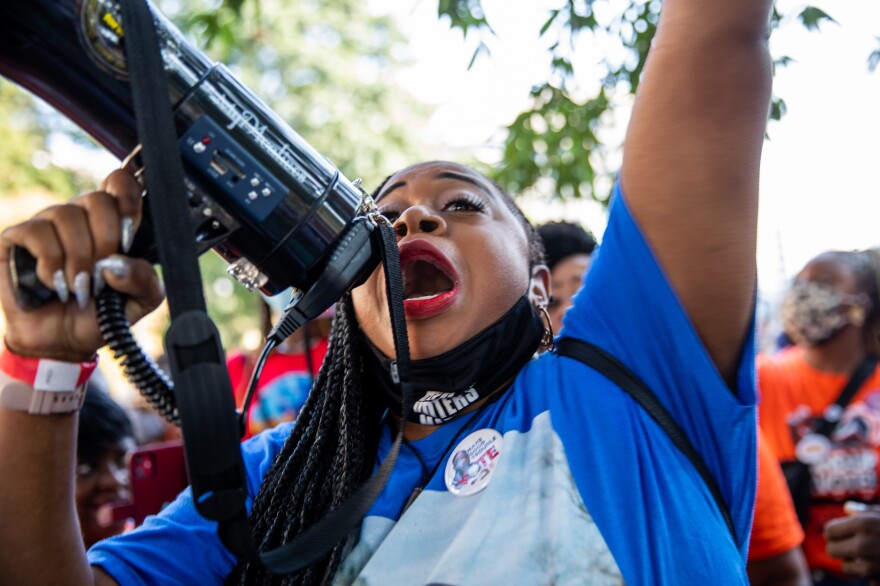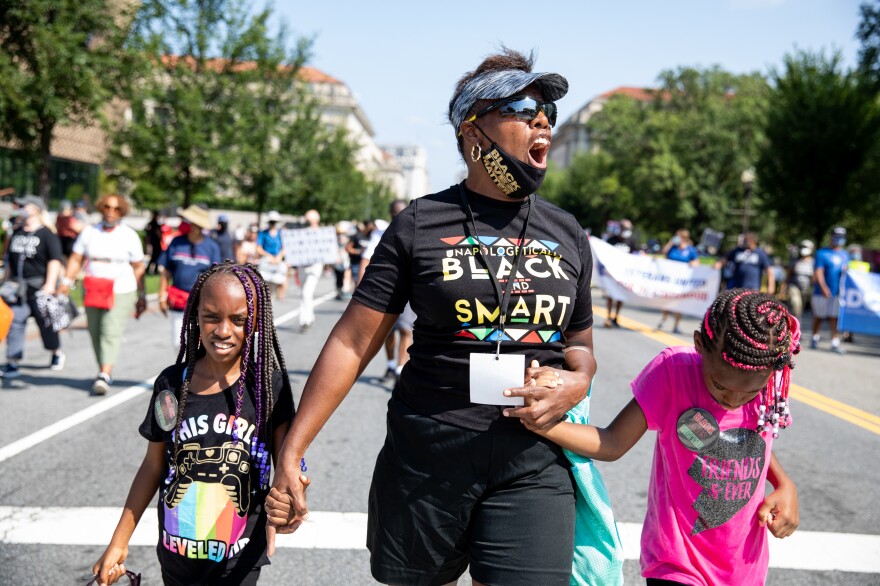Thousands of people gathered in Washington, D.C., and other cities across the country on Saturday to protest a recent slew of legislation that critics say suppresses voter rights, particularly for voters of color and young voters, in many Republican-led states.
The event, called the March On For Voting Rights, took place on the 58th anniversary of the 1963 March On Washington when Martin Luther King Jr. delivered his "I Have A Dream" speech. Sunday's event was organized by the Rev. Al Sharpton's National Action Network and partner organizations. Other events also took place in Atlanta, Miami and Phoenix.


In D.C., participants gathered early Saturday in McPherson square, and marched to the National Mall for a rally with the U.S. Capitol as a backdrop. Organizers say the event drew thousands to Washington.
What brought people out this time around
William Birdo, 82, traveled to D.C. from Los Angeles to participate in Saturday's march, and said he'd been protesting for civil rights for a half-century.
"Ever since time, we've been fighting," he said. "I'm from back there in the '60s, when we really protested the wars, and voting rights and civil rights, and everything else. And we won, and we made progress."
Birdo wasn't in Washington for the historic march in 1963, but says that he believes today's protests are part of the same fight.
"We must stand up, speak out and fight back. That's what we have always done to win or to get rights, for democracy here in America. You can't be quiet. You can't be afraid."
The event also drew out some participants who described themselves as new to politics.
Bill Wood, of Rockville. Md., said he was "never very political," but had been drawn into attending protests and events like this one after former President Donald Trump was sworn into office.

Wood wore a gold cape with the words, "I Vote" written in capital letters, and carried a sign that described the act of voting as a "superpower."
"Kill the filibuster, or make a carve-out. Pass voting rights laws. Put back in place the ones that they mistakenly took away with the Supreme Court so that you can get out to vote," he said.


Frank Smith was a civil rights activist with the Student Nonviolent Coordinating Committee who attended the 1963 march.
While the nearly six decades since that day have undoubtedly brought racial progress, he says some things have not changed.
"What has not changed is that there's been a just a drumbeat, a steady drumbeat of effort on the part of these Republican politicians to repress the Black vote, to take away Black voting rights," he said in a phone interview ahead of the march. "So we're still in a fight to maintain our voting rights that should be taken for granted because we are citizens of the United States."
What prompted the marches this weekend
Two years after the original March On Washington, the Voting Rights Act Of 1965 was signed into law, but two Supreme Court rulings in the last decade have weakened its enforcement powers. The latest ruling came in July and prompted the call for this weekend's national marches.
Organizers of the march say that the state-level legislation and the weakening of the Voting Rights Act "signal a return to the Jim Crow era."

New voting laws in Arizona, Arkansas, Florida, Georgia, Iowa, Kansas, Montana and Wyoming each differ but overall have the effect of restricting voter access, according to the Voting Rights Lab. Texas is set to pass its own new restrictions.
Some of the measures include tougher ID requirements for mail-in voting, curtailing drop boxes, reducing early voting hours and creating new crimes related to voting.
Protesters called on elected officials to protect democracy, including the passage of federal legislation that would ensure fair and easy access to voting across the country.
The John Lewis Voting Rights Advancement Act, named for the late Georgia congressman and civil rights leader, aims to restore the Voting Rights Act and was passed by the House earlier this week. It passed on party lines and is headed to the evenly divided Senate, where Democrats do not have the votes to overcome strong opposition from Republicans.

Protesters on Saturday also showed support for the For The People Act, which focuses on ending the gerrymandering of congressional districts, setting mandates for early and mail-in voting and increasing transparency in campaign financing.
Who spoke at the march in Washington, D.C.
Among those who addressed the crowd on the National Mall were Washington, D.C., Mayor Muriel Bowser; Alicia Garza, a co-founder of the Black Lives Matter movement; Martin Luther King III, his wife Arndrea Waters King, and their daughter Yolanda Rene King.


The Rev. Sharpton said the group decided not to go to the Lincoln Memorial this year because they wanted to focus on the Capitol, because it's there where "senators will decide whether to continue the segregationist legislative strategy of filibuster or whether they're going to give the people of this country the right to vote with no prohibition."
"That building is the target of our social justice movement. Not 58 years ago, but today," Sharpton said.
Copyright 2021 NPR. To see more, visit https://www.npr.org.






